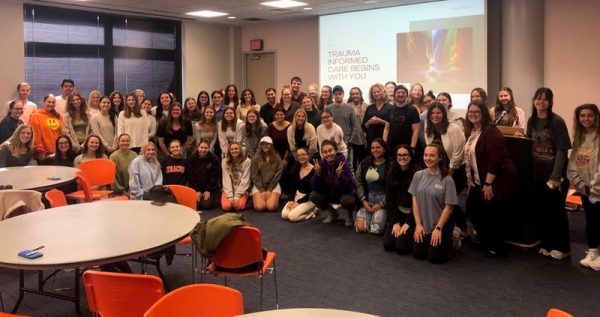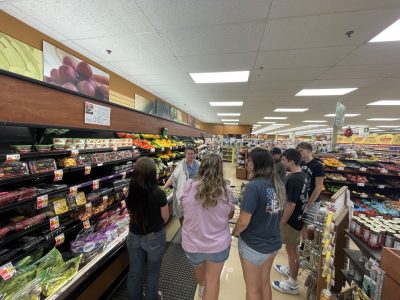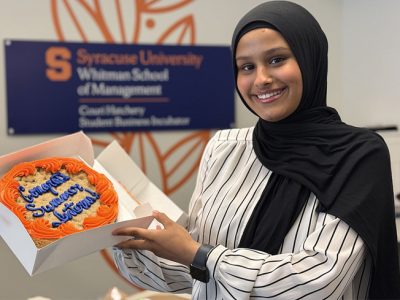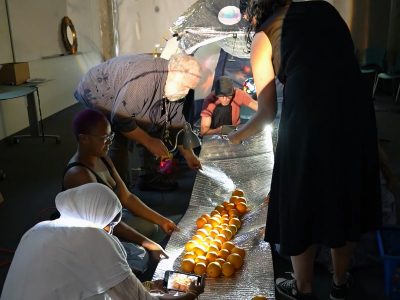Promoting Access to Equitable Health Care for Refugees in Central New York
Resettled refugees, also called new Americans, encounter myriad challenges from being displaced, ranging from financial stress to difficulties finding employment to lack of access to resources. These hurdles are magnified for new Americans who, in addition to possibly learning a new language, require speech, language and hearing services.
As the rate of asylum seekers arriving in the United States surges, Syracuse in particular is one of the highest intake cities in the United States, welcoming over 7,000 refugees in the past decade alone. To help ease the language barriers faced by new Americans, communication sciences professionals must be prepared to provide culturally responsive, human-centered, trauma-informed services for refugees who have complex educational and health care needs.
In response to this growing challenge, the College of Arts and Sciences’ Department of Communication Sciences and Disorders (CSD) has launched a new training program called Supporting Outcomes and Healthcare Access for Refugees (SOAR).
A first of its kind in the United States, SOAR provides the next generation of speech-language pathologists and audiologists with training in promoting health equity, interprofessional collaboration and experiential learning opportunities. CSD professors Jamie Desjardins and Stephanie McMillen lead the program, which received a $10,000 grant from the American Speech Language Hearing Association’s multicultural board in 2022 to support the project.
According to Desjardins, SOAR was established in part to respond to a recent report revealing that CSD clinicians nationwide are feeling underprepared and lacking confidence in servicing U.S. refugee populations.
“It is our responsibility, as a CSD higher-education program, to improve pre-professional training to better prepare our students for working with new Americans. We started SOAR to meet these needs in our community and profession.” – Jamie Desjardins
During the Fall 2023 semester, 19 CSD undergraduate and graduate students are participating in tailored classroom instruction and experiential learning activities. Together, these experiences allow students to learn about the needs and challenges that new Americans encounter when it comes to access to health care services.
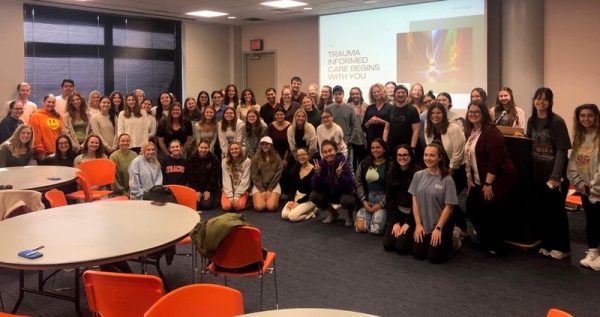
At an event in early October, students learned how to work with an interpreter to provide linguistically and culturally sensitive clinical services for patients learning English as a new language. They interacted with in-person and virtual interpreters in scripted, live-action clinical scenarios with an actor, who portrayed a patient with limited English proficiency.
SOAR also hosted a health care access and needs panel discussion with members of local community organizations who support New Americans. Panelists joined from the Upstate Refugee Healthcare Team, the North Side Learning Center and Interfaith Works. The discussions illuminated issues and needs related to health care access and communication health for refugees in the local community.
The program culminates with a refugee health fair in partnership with the Upstate Refugee Healthcare Team and Catholic Charities on Oct. 27 at the Catholic Charities Office (1654 W. Onondaga St. in Syracuse). New Americans are invited to receive free medical screenings, information about health literacy and other services from CSD faculty and students. Desjardins and McMillen will also be providing free hearing and language screenings. This event allows CSD students to integrate the skills and knowledge gained from SOAR to promote equitable and inclusive communication health care in a community-engaged setting.
McMillen says with no federal mandate to screen for communication disorders during the refugee resettlement process, SOAR will help address the critical health care disparity for new Americans in the local community.
“In 2022, the highest level of human displacement in recorded history occurred, when 35.3 million refugees across the globe fled their home countries due to persecution, violence and human rights violations,” McMillen says. “Newly resettled refugees need comprehensive health care—including communication health care comprising speech, language and hearing services—to ensure that everyone in Central New York can live healthy and fulfilled lives.”
By providing educational and clinical programming that is embedded in the community, members of CSD are helping to foster a healthy future for new Americans who call Syracuse home. SOAR is another example of how faculty and students are contributing to human thriving —one of the key areas of distinctive excellence in the University’s new Academic Strategic Plan.
“Communication is the foundation of our individual identities and who we are as members within our communities,” says McMillen. “The SOAR Program allows us, as CSD professionals, to rise and meet the needs of our New American clients and to promote health equity for communication health care.”
While the program is set to run through December 2023, organizers applied for additional grant funding to sustain this program and additional community-based efforts for new Americans.
